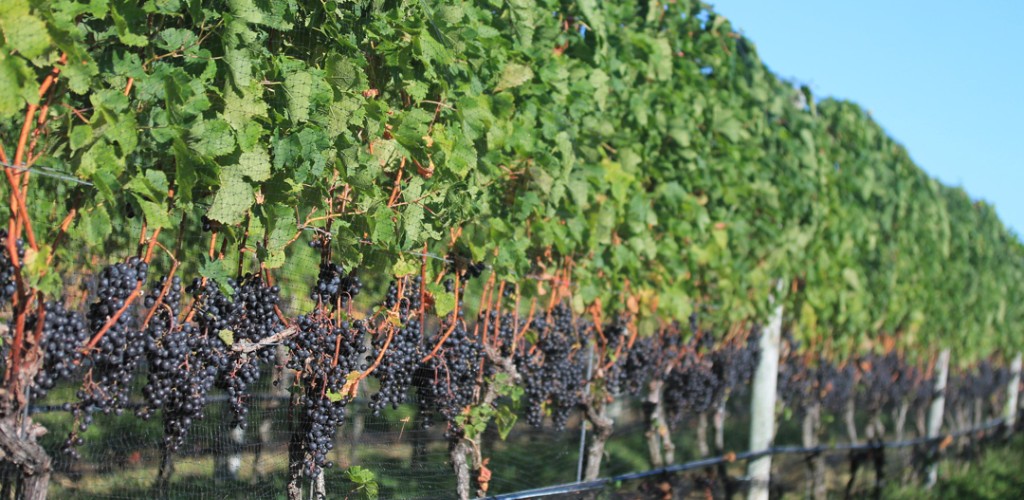Liberty Hyde Bailey once described extension work as “a plain, earnest, and continuous effort to meet the needs of the people on their own farms.” Now as extension professionals, viticulture and enology graduates Lindsay Jordan, M.S. ’14, and Justin Scheiner, Ph.D. ’10, use their Cornell experience to apply Bailey’s goal to the grape and wine industry every day.
Jordan and Scheiner’s shared desire to make a tangible difference in the lives of growers belies the fact that they do their work nearly 2,000 miles apart. Both graduate students of the Vanden Heuvel group, Jordan worked on under-vine cover crops for weed management and their impact on grape production during her time at Cornell, and several years earlier, Scheiner examined the connection of methoxypyrazine levels and ‘bell pepper’ aromas to vineyard practices.
Their diverse backgrounds and research interests easily translated into working in extension. Jordan is currently based in California as the University of California Cooperative Extension Area Viticulture Advisor for three counties in the arid San Joaquin Valley, while Scheiner works as an assistant professor and viticulture specialist at Texas A&M University.
“My favorite part has been getting to know my local growers, and getting to participate in applied research that can directly impact growers,” said Jordan. “It’s pretty much the dream.”
Jordan’s work focuses on best practices for raisin, table, and wine grape growers within the Madera, Merced, and Mariposa counties, both conducting research and disseminating information. Her current projects include a wine grape variety trial targeted towards identifying high quality grape varieties for wine production. “It’s a practical project that connects vineyard and winemaking practices to a long-term picture for San Joaquin Valley grape production, and I love doing that kind of work,” Jordan said.
Scheiner’s current research program at Texas A&M University focuses on best viticultural management practices for areas affected by Pierce’s Disease. This disease threatens grapevines throughout the Southern U.S. by preventing vines from drawing water, eventually killing the host plant. Scheiner balances this research while also teaching undergraduate courses including “Understanding Wine: From Vines to Wines and Beyond.”
“My favorite part of the job is helping growers solve problems and address challenges,” Scheiner said. “There’s often quite a bit of detective work involved, and it never gets boring.”
Both Jordan and Scheiner see the impact of their Cornell experience in their daily work. Jordan remembers Cornell as the whetstone upon which she sharpened her scientific skills. “Overall, the soil science courses at Cornell were phenomenal, giving me information and practical wet lab and field skills that I use all the time in my current job,” Jordan said.
On a broader level, Jordan also sees Cornell as the catalyst that set her on a path to her current career. “Driving back from a meeting, my advisor, Justine Vanden Heuvel, told me once that I should consider extension, because I had the personality for it.”
After graduate school, Jordan found herself moving towards extension. “Extension agents can have the most impact in terms of economic and environmental sustainability – and that is why they are so key,” Jordan said.
Reflecting on his time on the Hill, Scheiner remembered that he had considered Cornell mostly because of what he called “Cornell’s excellent reputation.” But once he made it to campus, he fell in love with the program.
“After visiting and meeting my future graduate advisor, I was convinced that it was the place for me,” said Scheiner. “With the exception of November-March, upstate New York is a fantastic place to live.”
Weather aside, Scheiner’s favorite aspects about Cornell included traveling across the state to research sites in Lake Erie, the Finger Lakes, and Long Island. According to Scheiner, “I have always enjoyed applied research, and I like being out in the field. In extension I have an opportunity to work very closely with grape growers, and stay tuned in to the industry.”
Jordan and Scheiner’s words and their success in extension work serve to capture the fundamental ways in which Cornell educates its students: the University provides students with the skills, connections, and scientific background to succeed, but also continues to develop in its students a genuine affection for the land and for the people who work it.
Matthew Linden ‘17 is a senior in the Viticulture and Enology Program at Cornell University. This article originally appeared in Appellation Cornell.





